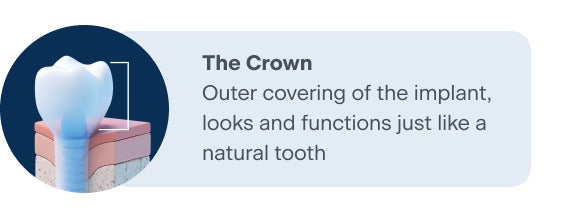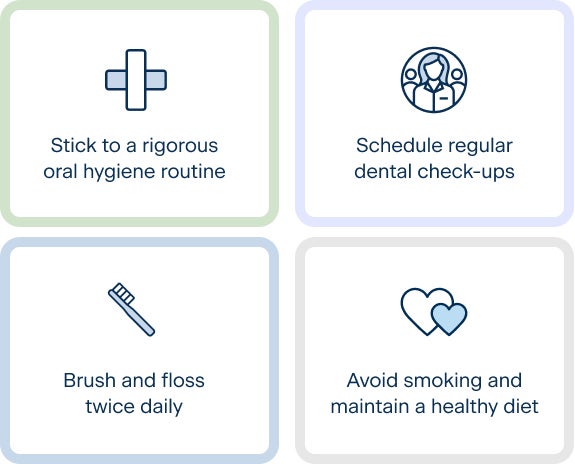How Long Do Dental Implants Last?
Explore dental implant longevity with ClearChoice. Discover insights on durability and lifetime value. Learn more.

Dental implants are the longest-lasting tooth replacement option. But just how long is that? “How long do implants last?” is usually the first thing ClearChoice Dental Implant Center® patients want to know. Dental implants are designed to be permanent, and with proper care, they can last a lifetime.
However, several contributing factors influence the dental implant lifespan. In this blog, we'll discover what makes dental implants last so long, and how taking proper care of them can lead to a lasting smile.
Understanding Dental Implants
Let's explore the three-part design of dental implants. Each component directly contributes to the dental implant lifespan. Understanding the function of each of these three working parts gives an insight into their total longevity.
The Implant

The foundational component of dental implants, and your dental implant lifespan, is the implant itself. Your implant dentist surgically inserts a titanium rod into the jawbone. This serves as the prosthetic root for the new tooth.
Over time, the implant fuses to the jawbone through a process called osseointegration. This component is designed to last a lifetime with proper oral hygiene and healthy habits.
The Abutment

The abutment is the connector piece between the implant and the crown. It connects the implant to the crown, acting as a support structure. It screws onto the top of the implant, where it sits like a short post above your gums.
Made of titanium or zirconia, the abutment most often has a similar lifespan to the implant. It requires replacement if loosened from injury, or poor oral hygiene.
The Crown

The crown, typically made of ceramic or porcelain, is the outer covering of the implant. Mounted atop the abutment, the crown could be a single false tooth, dental bridges, or a full set of teeth. Usually crafted of ceramic or porcelain, the crown is custom-made to fit your mouth.
As the visible part of the dental implant, it looks and functions just like a natural tooth. Crowns can last 10 to 15 years, depending on wear and tear, but with excellent care, it may last longer.
Factors Affecting the Lifespan of Dental Implants

Many factors affect the longevity of your dental implants. The success rate of dental implants depends on good oral hygiene, lifestyle choices, and pre-existing health conditions.
If ignored, these factors can cause your implant to fail.
Oral Hygiene
A well-taken care of implant has the potential to last you the rest of your life. That's why maintaining a consistent oral hygiene routine is crucial. Oral hygiene for dental implants can be different than caring for your natural teeth. Brush with a soft-bristled toothbrush twice a day for at least two minutes, floss daily, and use an alcohol-free antiseptic mouthwash.
Regular dental check-ups every six months are also essential. Cleaning appointments are a key component of effective dental implant care.
Lifestyle Choices
Smoking and using chewing tobacco can significantly reduce the lifespan of your dental implants. These products run a high risk of complications with the surgical implant process. Quitting these habits will improve overall oral health and the durability of your implants.
Additionally, we encourage a diet low in sugar and free from sticky or hard foods. When you overindulge in sugar, it can lead to a build-up of plaque that puts your implants at risk.
Finally, never use your new teeth to open bottles or packages. Protect the integrity of your implants to prolong their lifespan.
Health Conditions
Medical conditions like gum disease, teeth grinding, and TMJ can affect the success and longevity of dental implants. Talk to your doctor about managing pre-existing health conditions.
Best Practices for Maintaining Dental Implants
Dental implants offer a durable and long-lasting solution for tooth replacement. By following proper care routines and making healthy lifestyle choices, you can maximize the lifespan of your implants.
Maintaining dental implants is a matter of daily care. Let's recap our dental implant care tips:

Addressing Common Concerns
Age, the placement of your dental implants, and health conditions are unique factors that change with each individual patient. Dealing with one or more of these pre-existing conditions can shorten the length of your dental implants lifespan. However, it’s important to note that dental implants may remain the most permanent and longest-lasting option.
Aging and Bone Density
Let's examine dental implants and aging. As you age, bone density decreases, which can affect implant stability. As mentioned earlier, the implant itself is the foundational component of your dental implants. To function properly, the implant must anchor into the jawbone.
This requires enough healthy bone surrounding the implant to fully fuse into place. Low bone density and osteoporosis can pose a challenge here, as they cause bone loss at a more rapid pace. When this occurs, the implant can become less stable, shortening the expected lifespan of the dental implant.
Implant Placement and Wear
The placement of your implant also makes a difference. Our front teeth don't experience the same level of wear and tear as our back teeth do. This is because our back teeth do most of the biting down and chewing.
For this reason, dental implants replacing back teeth wear out more quickly than those placed at the front of the mouth. The crown component of back implants may potentially require restoration replacement sooner than front teeth.
Gum Disease
Dental implants and gum disease are a common issue to watch out for. Periodontal disease is treatable, but untreated gum disease can cause the gums to recede, which exposes your implant components. This leaves you more susceptible to infections, and increases the risk of damage and early replacement.
Grinding and TMJ
Bruxism (tooth grinding) and the joint disorder TMJ exert excessive force on implants. The repeated motion of grinding and clenching teeth can potentially lead to loosening or damage of your crown. It can even impede the healing process where your implant fuses in place. Using a custom-fit protective mouthguard can mitigate these effects.
Professional Care and Expertise
While many factors of your dental implant lifespan are up to you, a successful dental implant surgery is the first step. Choosing a skilled and experienced surgical team is an integral factor for a successful, long-lasting dental implant. Skilled oral and maxillofacial surgeons, along with prosthodontists, provide professional dental care and optimal treatment outcomes.
ClearChoice Dental Implant Centers bring together all the specialists, clinical staff, and elements needed for a successful treatment. We’ve helped to give over 200,000 patients new smiles and new leases on life.
Take the first step toward a long-lasting smile. Find a ClearChoice location near you and schedule a consultation with one of our trusted surgeons.
Frequently Asked Questions
How long do dental implants last on average?
With proper care, dental implants can last a lifetime. The crown typically lasts 10-15 years but can last longer with excellent care.
What can shorten the lifespan of dental implants?
Several elements can reduce implant longevity. This includes poor oral hygiene, smoking, unhealthy diet, and certain health conditions like gum disease and teeth grinding.
How often do dental implants need to be checked?
We recommend a regular dental check-up every six months to ensure the health and stability of dental implants.
Can lifestyle changes improve dental implant longevity?
Yes, you can significantly extend the life of dental implants with healthy lifestyle changes. This includes quitting smoking, maintaining a healthy diet, and following a strict oral hygiene routine.
What should I do if my dental implant feels loose?
Contact your dentist immediately if an implant feels loose. Early intervention can prevent further damage and potential implant failure.
How do I choose the right dental professional for implants?
Look for experienced oral surgeons and prosthodontists. ClearChoice provides a team of specialists who work together to ensure the best outcomes.
